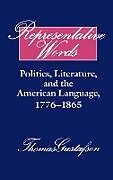Representative Words
Einband:
Fester Einband
EAN:
9780521395120
Untertitel:
Politics, Literature, and the American Language, 1776 1865
Genre:
Sprach- und Literaturwissenschaften
Autor:
Thomas Gustafson
Herausgeber:
Cambridge University Press
Anzahl Seiten:
488
Erscheinungsdatum:
09.06.2003
ISBN:
978-0-521-39512-0
Klappentext Thomas Gustafson examines how and why Americans renewed and developed the tradition of writing connecting political disorders and the corruption of language between the ages of the Revolutionary and the Civil Wars. Zusammenfassung Ralph Waldo Emerson's dictum 'The corruption of man is followed by the corruption of language' belongs to a long tradition of writing connecting political disorders and the corruption of language that stretches back in Western culture. Thomas Gustafson examines how and why Americans renewed and developed this tradition between the ages of the Revolutionary and the Civil Wars. Inhaltsverzeichnis Acknowledgments; Introduction; Part I. The American Logocracy: The Nexus of Word and Act: 1. Political and linguistic representation: confidence or distrust?; 2. Language and legal constitutions: the problem of change and who governs; Part II. Political and Linguistic Corruption: The Ideological Inheritance: 3. The classical pattern: from the order or Orpheus to the chaos of the Thucydidean moment; 4. The Christian typology: From Eden to Babel to Pentecost; 5. Eloquence, liberty, and power: civic humanism and the counter-renaissance; 6. The enlightenment project: language reform and political order; Part III. The American Language of Revolution and Constitutional Change: 7. The language of revolution: combating misrepresentation with the pen and tongue; 8. The grammar of politics: the constitution; Part IV. From Logomachy to Civil War: The Politics of Language in Post-Revolutionary America; 9. The unsettled language: schoolmasters vs. truants; 10. Corrupt language and a corrupt body politic, or the disunion of words and things; 11. Sovereign words vs. representative men; Afterword; Notes; Index.
Klappentext
Ralph Waldo Emerson's dictum--"The corruption of man is followed by the corruption of language"--belongs to a long tradition of writing, connecting political disorders and the corruption of language, that stretches back in Western culture. Representative Words, which gives an account of the tradition from its classical and Christian origins through the Enlightenment, is primarily a study of how and why Americans renewed and developed it between the ages of the Revolutionary and the Civil Wars. It is the first comprehensive treatment of the background to and the appearance of the wealth of theories about language in the early era of American political and cultural discourse. Professor Gustafson's argument demonstrates the interconnectedness of the state of language and the state of society and turns on the question of representation and misrepresentation--whether and how words represent or misrepresent nature, social reality, truth, and value in the new American experiment in representative republican government.
Zusammenfassung
Ralph Waldo Emerson's dictum 'The corruption of man is followed by the corruption of language' belongs to a long tradition of writing connecting political disorders and the corruption of language that stretches back in Western culture. Thomas Gustafson examines how and why Americans renewed and developed this tradition between the ages of the Revolutionary and the Civil Wars.
Inhalt
Acknowledgments; Introduction; Part I. The American Logocracy: The Nexus of Word and Act: 1. Political and linguistic representation: confidence or distrust?; 2. Language and legal constitutions: the problem of change and who governs; Part II. Political and Linguistic Corruption: The Ideological Inheritance: 3. The classical pattern: from the order or Orpheus to the chaos of the Thucydidean moment; 4. The Christian typology: From Eden to Babel to Pentecost; 5. Eloquence, liberty, and power: civic humanism and the counter-renaissance; 6. The enlightenment project: language reform and political order; Part III. The American Language of Revolution and Constitutional Change: 7. The language of revolution: combating misrepresentation with the pen and tongue; 8. The grammar of politics: the constitution; Part IV. From Logomachy to Civil War: The Politics of Language in Post-Revolutionary America; 9. The unsettled language: schoolmasters vs. truants; 10. Corrupt language and a corrupt body politic, or the disunion of words and things; 11. Sovereign words vs. representative men; Afterword; Notes; Index.

Leider konnten wir für diesen Artikel keine Preise ermitteln ...
billigbuch.ch sucht jetzt für Sie die besten Angebote ...
Die aktuellen Verkaufspreise von 6 Onlineshops werden in Realtime abgefragt.
Sie können das gewünschte Produkt anschliessend direkt beim Anbieter Ihrer Wahl bestellen.
Loading...
Die aktuellen Verkaufspreise von 6 Onlineshops werden in Realtime abgefragt.
Sie können das gewünschte Produkt anschliessend direkt beim Anbieter Ihrer Wahl bestellen.
| # | Onlineshop | Preis CHF | Versand CHF | Total CHF | ||
|---|---|---|---|---|---|---|
| 1 | Seller | 0.00 | 0.00 | 0.00 |
